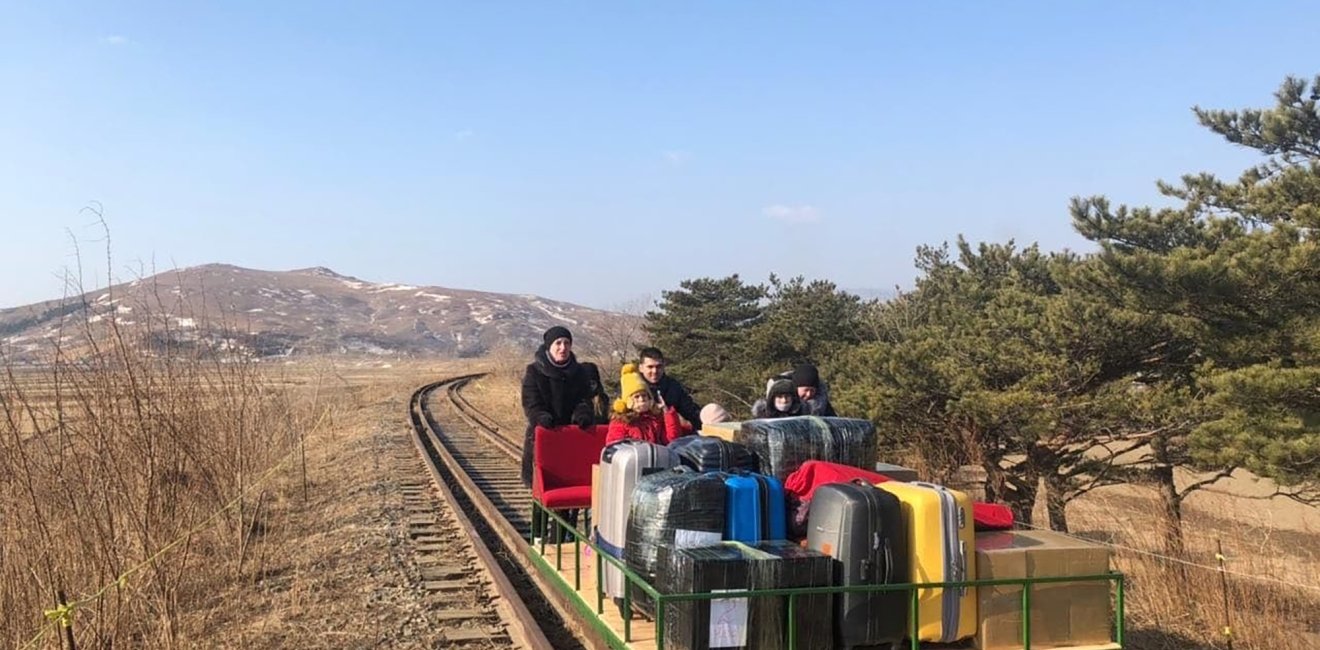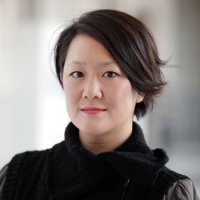Goodbye, Pyongyang
As North Korea’s isolation deepens, foreign diplomats take drastic measures to leave.

A blog of the Indo-Pacific Program
As North Korea’s isolation deepens, foreign diplomats take drastic measures to leave.

In the final stretch of the long journey from Pyongyang to Moscow, a Russian diplomat loads his family’s possessions onto a wooden cart. His children — the youngest just 3 years old — clamber on top, muffled against the winter cold. Through the biting February cold, the cart inches through the desolate North Korean countryside as the diplomat pushes from behind to help the group of eight reach the Russian border. In all, it’s a journey that takes nearly three days by train, bus and cart.
Amazingly, this is not a scene from 1821. It’s North Korea in 2021.
It’s been more than a year since North Korea shut its borders in January 2020. Since then, Pyongyang has instituted security zones near borders with with orders to shoot at infiltrators and strict quarantine measures that have all but stopped the flow of goods into the country.
Germany’s diplomats were the first to leave, suspending operations at their embassy in Pyongyang last March, followed by French officials. The British ambassador left in May, the Swedish ambassador in August. Over the summer, 27 Russians left North Korea, and in recent weeks, the Czech Embassy shuttered its doors.
British Amb. Colin Crooks bid adieu with a tweet; Sweden’s Joachim Bergstrom shared a few last shots of yoga around the capital. But it’s the Russians’ photographs and video last week that best capture the sad and strange way that North Korea’s deepening isolation is playing out on the ground.
Sad to say farewell this morning to colleagues from German Embassy and French Office #NorthKorea which are closing temporarily. #BritishEmbassy remains open. #àbientôt #bisbald in #Pyongyang #DPRK pic.twitter.com/bHWPFixiiI
— Colin Crooks (@ColinCrooks1) March 8, 2020
I know firsthand how tough life is, for North Koreans as well as foreigners living in Pyongyang.
As a foreign correspondent who ran a news bureau in Pyongyang, I had to bring everything we might need in the largest, lightest suitcases I could find. Everything from toothpaste and toilet paper for everyday use to antibiotics, aspirin and First Aid kits with dehydration tablets for my monthly bouts of stomach flu in a country where the water was not clean and frequent power outages meant spoiled food.
But also: office supplies, including batteries, solar panels and even sheafs of printer paper, a rare commodity in Pyongyang; the instant ramen noodles my North Korean staff devoured, and miso soup, ground coffee and a French press for my morning meals. And significantly: the cash we needed to run our operations since we could not, due to sanctions, use the North Korean bank account I had opened.
Foreign residents can purchase limited goods at certain department stores that cater to those with cash. But I wonder how much that coveted supply has dwindled over the past year, given the tightened restrictions.
Foreign residents can purchase limited goods at certain department stores that cater to those with cash. But I wonder how much that coveted supply has dwindled over the past year, given the tightened restrictions. And having sampled North Korean lotions and soaps, I was so alarmed by the quality that I worried that using the products would harm my health.
Diplomats typically import most of what they need through diplomatic pouches. But with the border closed, it’s likely that such pouches have not made their way in for many months. And while we learn from the North Koreans on how to be resourceful, there’s only so far you can go with so little. Living as a foreigner in North Korea is like a modern-day game of Survivor. How long can you go cut off from the outside world before you beg to be taken off the island?
Last month, Russia’s Amb. Alexander Matsegora described bare shelves and being unable to buy flour, oil, and sugar, particularly since September. And something I hadn’t considered: struggling to find clothes or shoes for growing children.
“Of course, we aren't hungry, we don't complain, and we adapt,” he told Interfax, echoing the stoicism that helps the North Koreans get through continued hardship.
And then there are the suffocating travel restrictions in a country where there is no freedom of movement — if fuel is even available. Foreign diplomats rely on being able to leave North Korea for R&R at regular intervals; being cooped up in even a relatively luxuriously diplomatic compound would take its toll on the mental health of even the most even-keeled diplomat, not to mention their families.
What I worried about most, however, was the lack of medicine and adequate healthcare. I still have nightmares about suffering a medical emergency in North Korea, and being taken to a hospital without heat, hot water, or anesthesia.
It’s not just diplomats who are leaving. The UN and NGO presence, which was thriving when I was in Pyongyang, has all but gone. Unable to get aid into North Korea, the World Food Program said it may be forced to suspend activities. And without Western journalists on the ground, we rely more heavily on North Korean state media for information, allowing Pyongyang to control the narrative.
But if [foreigners] are struggling, we can only imagine how much greater the hardship is for North Koreans.
I recognize the inequity in focusing on the hardship of foreigners, who live privileged lives in Pyongyang. But if they are struggling, we can only imagine how much greater the hardship is for North Koreans.
“Such self-isolation has negatively impacted the economy and people's living conditions,” Matsegora said. “Many enterprises have come to a standstill, and therefore people have lost their jobs, because there are no imported materials, resources, or parts.”
North Korea continues to claim it has no confirmed COVID cases. Even if that questionable claim is true, and they have succeeded in keeping the virus out, there is no doubt that the extreme measures are taking a toll not only on the people but also on our efforts to bring North Korea into the international fold.
Shutting the doors is not an easy decision; once you leave, it’s not easy to get back in. It could take years to build the Western foreign presence back up once the borders are open again.
These are decisions made by the leadership in Pyongyang, both to protect against the pandemic as well, I suspect, to keep prying eyes out. North Korea relies on preventative public health measures, including entry bans and extensive quarantines, because it does not have the capacity to deal with a pandemic. But I believe the leadership also uses the restrictions as a way to restrict the flow of information across the border at times of political uncertainty.
Signs preceded the pandemic. In August 2019, in the months of uncertainty following the collapse of nuclear talks in Hanoi, North Korean officials told the United Nations to cut the number of international staff posted to Pyongyang, Reuters reported.
North Korea instituted similarly restrictive bans in late 2014 and early 2015, citing concerns about the spread of Ebola. I don’t think it’s a coincidence that the border restrictions were issued at a time of speculation about Kim Jong Un’s health after he disappeared from public view.
How we draw North Korea out of isolation is a matter of debate among Korea watchers. But regardless, it’s safe to assume that the pandemic has taken an immeasurable toll on the everyday lives of North Koreans.
Unfortunately, we just can’t see it. And with every foreign departure, we have fewer inroads into what’s happening inside a country that is becoming ever more hidden from view.
Jean H. Lee is director of the Hyundai Motor-Korea Foundation Center for Korean History and Public Policy at the Wilson Center. Before joining the Wilson Center, she served as chief of the AP news agency’s Seoul and Pyongyang bureaus.
Follow Jean H. Lee on Twitter and Instagram @newsjean. Follow the @Korea_Center on Twitter and @wilsoncenterkorea on Instagram.
The views expressed are the author's alone, and do not represent the views of the U.S. Government or the Wilson Center. Copyright 2020, Asia Program. All rights reserved.


The Indo-Pacific Program promotes policy debate and intellectual discussions on US interests in the Asia-Pacific as well as political, economic, security, and social issues relating to the world’s most populous and economically dynamic region. Read more


The Center for Korean History and Public Policy was established in 2015 with the generous support of the Hyundai Motor Company and the Korea Foundation to provide a coherent, long-term platform for improving historical understanding of Korea and informing the public policy debate on the Korean peninsula in the United States and beyond. Read more
